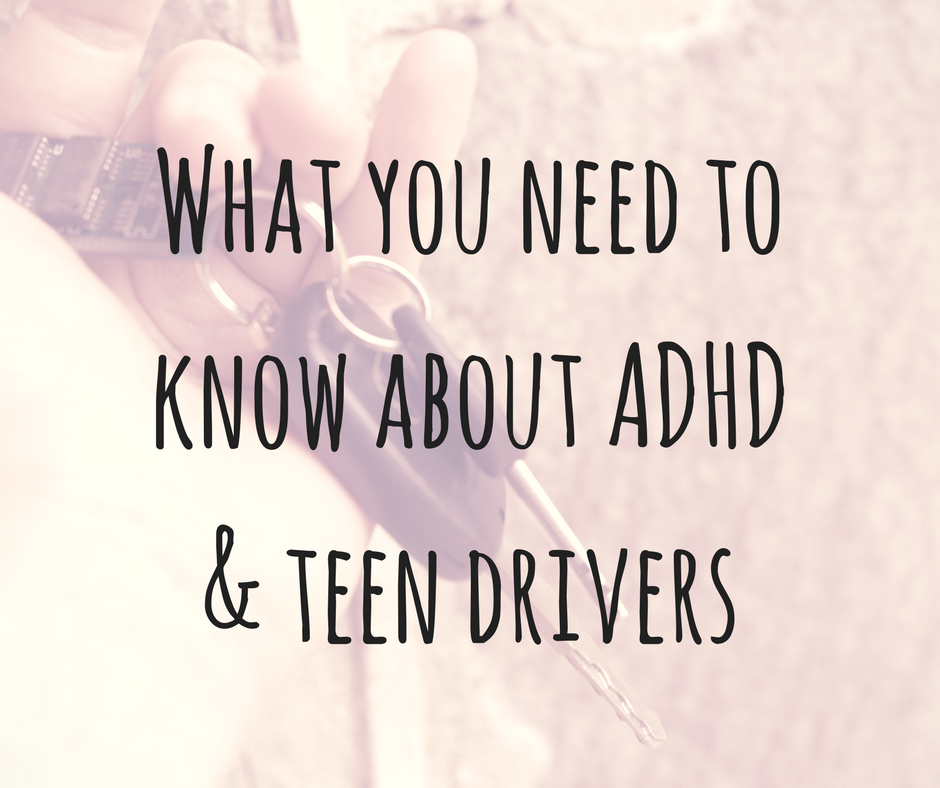“My teen son has ADHD, and I know this makes him more likely to die in a car accident.”
This was how this week’s guest blogger, Mark Connor, opened his introductory email to me. It hit home. 16 years ago this month, I took my driver’s license test. I’ve officially been driving for half my life, and I’m still alive. Several of my high school classmates weren’t so lucky.
My dad is a professional driver, and he made sure I took driving seriously. He — and my mom, aunt, and uncle, who teamed up to give me lots of driving practice — also taught me on a stick shift, which helped keep me in the parking lot for long enough to get comfortable behind the wheel before I hit the road.
Kids like me are very fortunate. So, I’m sure, is Mark’s son. Mark created a website called Drive Safely to help spread the word about vehicle safety. Here, he shares a few pieces of wisdom from his journey parenting a teen driver with ADHD.

Driving is already the most dangerous thing teenagers do, with thousands of teens dying in automobile accidents every year. The risk is even greater for teen drivers with ADHD. According to one study, young drivers with ADHD received significantly more moving and non-moving violations than drivers without ADHD.
However, just because the risk is greater doesn’t mean that teens with ADHD can’t become safe, successful drivers. Here’s what you need to know about ADHD and teen drivers.
Facts to Know
In 2015, over 2,000 teens aged 16 to 19 died in motor vehicle accidents, and more than 200,000 were injured. While this is the lowest number of teen driving deaths ever recorded in one year, it’s nevertheless a devastating statistic.
Evidence shows that new drivers with an attention deficit are prone to riskier behavior behind the wheel. Teen drivers with ADHD are:
- Four times more likely to speed.
- Five times more likely to receive a parking ticket.
- Three times more likely to lose their license within the first five to eight years of driving.
- Two to three times more likely to be in a car accident.
In addition to these worrying numbers, teens with ADHD more frequently pass other vehicles improperly, tailgate, fail to obey traffic signs and signals, and even drive while under the influence of alcohol.
What You Can Do
Parents of children with ADHD won’t be surprised by the increased risk for their teen drivers. They’re familiar with the minds that struggle to stay on task and the impulsive behavior. What they may be unsure of, however, is how to help their teen succeed behind the wheel.
Involved parenting is instrumental in teaching attention-deficit teens safe driving habits. Parents should first ensure their child is taking any medication prescribed by their doctor. Step two? Consider whether a teen is prepared to start driving at all. Teens with ADHD who are still learning to manage their behavior may be best served by a delayed start to driving. While no teen wants to be late getting their driver’s license, staying safe is the most important thing.
Parents should spend plenty of time practicing driving before taking their teen to the license bureau. Learning under parental supervision will empower a teen to make the best possible choices behind the wheel, and parents will be able to identify and address the specific challenges faced by their teen. On top of covering good driving habits, discuss common roadside concerns like jumping a battery and staying safe in a roadside emergency.
Extra practice isn’t the only adjustment to make for teens with ADHD. Promote good behavior behind the wheel by instituting the following rules:
- No cell phone usage while driving.
- No more than one passenger at a time.
- No passengers during after-school hours or on weekend evenings, the most dangerous times for teen drivers.
- No adjusting music while driving. Consider equipping vehicles with voice-activated technology to remove the temptation.
A written safe driving contract can create accountability between teen drivers and their parents. A safe driving contract should include mutually agreed upon rules to observe behind the wheel, and appropriate consequences if those rules are broken. That may mean restricting driving privileges if a teen is caught driving with too many passengers, or making teens pay fines incurred from driving infractions. No matter the rules you settle on, promote compliance by consistently applying consequences.
Just because a teen has ADHD doesn’t mean he or she can’t become a safe driver. Give teens the tools to drive responsibly by addressing the unique challenges of ADHD head-on.
Hey there! Are you enjoying The ADHD Homestead?
Here's the thing: I don't like ads. I don't want to sell your attention to an advertising service run by the world's biggest data mining company. I also value my integrity and my readers' trust above all, which means I accept very few sponsorships/partnerships.
So I'm asking for your support directly. For the cost of one cup of coffee, you can help keep this site unbiased and ad-free.
Below you will find two buttons. The first lets you join our crew of Patreon pals and pledge monthly support for my work. Patrons also have access to my Audioblogs podcast. The second takes you to a simple donation page to pledge one-time or recurring support for The ADHD Homestead, no frills, no strings. Do whichever feels best for you!

